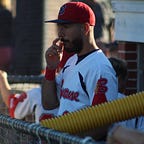Creating Common Vocabulary
Language is one of the most important tools that we as coaches have. Creating a system around vocabulary for both players and coaches is a worthwhile task to undertake for just about every team and organization. As baseball teams start to look more like schools in just about everything they do, I think that looking at how schools have created systems like this might help us to get a feel for what might be able to be done to help with this.
Creating a systematic approach to vocabulary has several benefits for everyone involved. Schools have invested heavily in reading and math programs that have teachers using the same concepts, and vocabulary so that as students progress through different grades they aren’t continuously learning new words for the same concepts. Schools have attempted to have teachers use similar terms and activity names to make learning more efficient. Why re-learn a concept by a new name if students already have a good grasp of it from a previous grade level.
We see this a lot in coaches as well. Where a player will learn and display a technique or movement only to ‘graduate’ to a new level only to have to relearn the same move that is put in a different way. Or we have coaches use different names for drills, activities, and movements which creates a sense of confusion from players and other coaches when they use different vocabulary. This creates a situation where players are essentially re-learning the same drills only to categorize them into different words. This wastes critical time in the development process as a player begins to merge their previous understanding with a new concept that the coach is attempting to instill.
An example of this may be a specific concept. We have a player who is drafted by an organization and they come in with a basic understanding of Attack Angle. Their college coach used it and they have experience with the concept. All of a sudden their new organization has a coach who emphasizes ‘Getting Extended’ and explains that as the bat moved through the zone the extension is where players start to get loft.
The player now has two separate concepts that are in their mind. First the newest concept of extension that the coach is emphasizing and also this dormant concept of Attack Angle. Over the weeks to come the coaches continues to talk about getting good ‘Extension’ in their swing and the player starts to develop and show characteristics that fit the coaches profile. After a few months the player has some success and they move from Low A to High A only to find that their new Hitting Coach is using the concept of Attack Angle. The terms Extension which took weeks to teach, and explain is now taken over by Attack Angle which the player now has to fit back into their knowledge.
The amount of time that this wastes for both players and coaches can be extreme. Even as the player move through a system We are wasting plenty of time reteaching concepts that should be consistent across the board.
Another example of this comes from the use of drills. Developing a menu of sorts might be one of the most powerful parts of vocabulary. Being back to tell a player ‘Hook Em Drill’ and have them immediately know and understand the concept of the drill makes a world of difference for a practice situation. Creating a systemic vocabulary and having coaches and players both understand the concepts and goals of a drill saves times. Which is the most valuable things that coaches have. There is a lot of development time that is wasted explaining, defining, and exploring drills. When more powerful as coaches move through different levels if they know what the drill menu consistent of it makes ‘catching’ players up relatively simple task. Coaches don’t need to take time and look at the goals of a drill or what is expected players show up with clear understanding of what is going on.
Creating a common vocabulary among an organization is a relatively small things to do, but it makes a world of difference in creating systems and efficiency that we might be looking for. If nothing else it makes running a practice smoother, and lets players get more comfortable with familiar concepts throughout our time with them.
